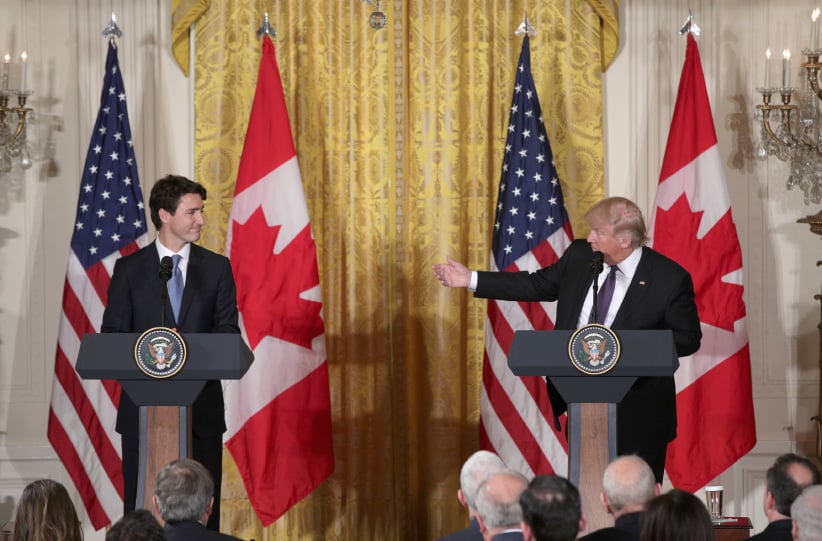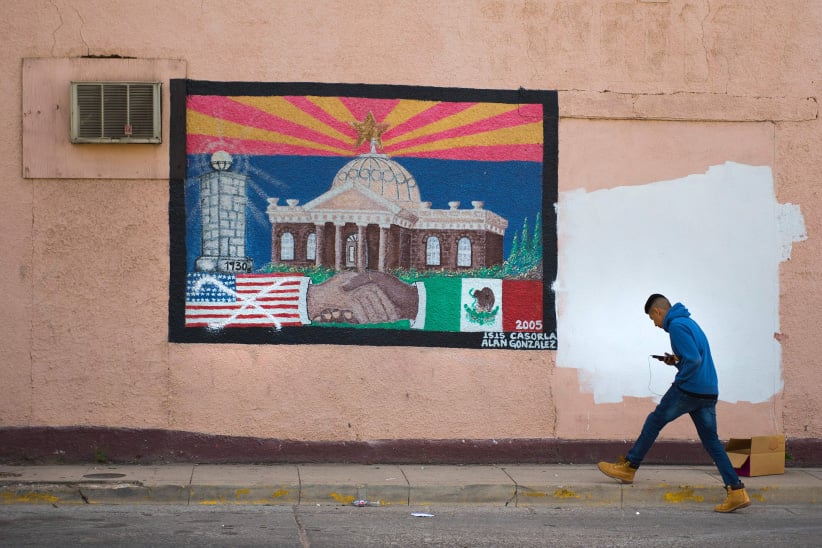Mexicans worry: Will they become the third-wheel Amigo?
A cozy summit between Donald Trump and Justin Trudeau has left Mexicans suspicious about whether Canada will leave them behind
A man walks past a burial of US/Mexico cooperation, in which the American flag has been crossed-out, in Nogales, Arizona, on February 17, 2017, on the US/Mexico border. (Jim Watson/AFP/Getty Images)
Share

The envy of Mexicans began to rise early during the recent press conference between President Donald Trump and Prime Minister Justin Trudeau. “We have an outstanding trade relationship with Canada,” Trump gushed. “We have before us the opportunity to build even more bridges.” He then turned an unfriendly focus to the southern border, and a familiar whipping boy: Mexico. “For many, many years, the transaction [between the U.S. and Mexico] was not fair to the United States.” On this, Trudeau was silent.
The contrasts didn’t go unnoticed in Mexico, which has come to feel like NAFTA’s forgotten “amigo” in what’s supposed to be a trilateral deal—and been treated as anything but a friend by Trump, whose Twitter tantrums and calls for a border wall have scared off investment, caused the peso to plunge, and prompted President Enrique Peña Nieto to cancel his own trip to Washington. “Bridges for Canada, wall for Mexico,” José Díaz-Briseño, Washington reporter with the newspaper Reforma, tweeted after the presser. “Both are majority white and speak English. All good!” tweeted Jorge Guajardo, a former Mexican ambassador to China.
Adding to the angst in Mexico are suspicions that Canada would cut Mexico loose rather than fight for a friend—especially at a time when other countries in Latin America, long overlooked by Canada, show expressions of solidarity. Reports that Canada might be considering seeking a bilateral deal with the United States made headlines in Mexico, which had reoriented its economy towards exporting to North American markets over the past 25 years. Canadian officials have tried to reassure their Mexican counterparts and the public that relations are as important as ever. “We have a free trade agreement, but if the United States leaves, the FTA becomes a two-country agreement with Mexico,” Canadian ambassador to Mexico Pierre Alarie told broadcaster Televisa. “We’re here to repeat: We will not abandon (Mexico).”
But the episode has shattered stereotypes here about Canada and showed the rude potential reality of a friend putting self-interest ahead of ideals. “’We will have Canada’—or so we thought—a brother with better morals and ethical standards, which practices what it preaches and puts people ahead of ambitions. But its image is only that: image. All the values that it touts are shelved as needed,” Alejandro Páez Varela, editor of the online publication SinEmbargo, wrote in a column titled, “Gracias, Trump.”
“Canadians have this sort of reputation of being cool, nice, caring. But in this one instance they have made it very clear we are on our own,” said Carlos Bravo Regidor, professor at the Centre for Teaching and Research in Economics. “It hurts a bit. The cool kid in the neighbourhood has told us to f–k off.”

Canada isn’t considered cool in too many countries, but the country carries some cachet in Mexico, even if it isn’t especially well-known. Canadian investment is substantial in Mexico, though attempts at promoting the country have been hit or miss—most notably a government-sponsored food truck peddling poutine in posh neighbourhoods. Much of the popularity came through education exchanges, which became fashionable in the late 90s, helped by a low loonie, Canada’s positive perceptions, and proximity. The high-water mark arrived in 2005, when the Canadian Tourism Commission and Travel Alberta imported the teen telenovela Rebelde for five episodes in Calgary and Banff in 2005. The promotional pictures of three Rebelde co-stars posing at Lake Louise in bikinis and fur coats went viral, while the show’s spinoff band RBD (sort of a Mexican version of S Club 7) filmed a popular music video.
Visa rules imposed suddenly in 2009 to stem a flow of asylum seekers somewhat soured relations. And while Canadian officials insist students continued travelling north in high numbers, tourists started to opt for other places, as stories emerged of Canadian visas costing more than U.S. visas—with the application process requiring more paperwork. Some intellectuals stayed away, out of principle. “They were the first to be Trumpians,” said Federico Estévez, a political science professor at the Autonomous Technological Institute of Mexico, who boycotted Canada during the visa years. “You’re betting on a trilateral thing and Canada’s saying, ‘We don’t want you.’ ”
Since the visa rules were relaxed, most Mexicans appear to be letting bygones be bygones. Student interest in Canada is still strong—with the line stretching more than 100 people deep to enter the annual EduCanada educational fair in Mexico City earlier this month. Juan Carlos Roan was one of them, saying he wanted to study a PhD in agricultural biotechnology at a foreign school and saw advantages to Canada, such as the student visa rules and ability to work while in the country. But, like most, he confessed looking harder at Canada than the United States. “It’s a more welcoming country,” Roan said. “I’m not really looking at the United States due to the political situation.”
As for Canada possibly abandoning Mexico, he was quick to comment, “I completely understand. You have to do what you have to do.”